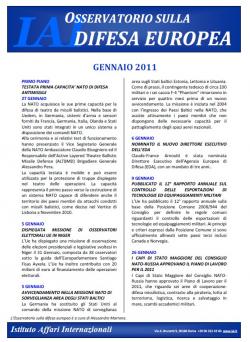Observatory on European defence, January 2007

1 January 2007
Eu Presidencies: Germany, Portugal, Slovenia - ESDP Programme, Enlargement and Constituion
Germany, Portugal and Slovenia, the countries that will be holding the EU Presidency as of 1 January 2007, have presented a programme - for the first time covering 18 months - touching on several CFSP and ESDP issues.
The crisis hot spots are the Balkans and the Middle East.
The ESDP developments will be devoted to civil and military capabilities and their coordination.
On the institutional side, the Presidencies propose a stronger mandate for the ESDP Agencies (European Defence Agency, EU Institute for Security Studies and EU Satellite Centre). The German foreign minister pointed out three ESDP priorities for 2007: missions (Kosovo), capabilities (Battlegroups) and cooperation with partners (NATO, UN and African Union).
Other priorities concern security. In particular, in the fight against terrorism and organised crime, a gradual strengthening of Europol and the European Agency for the Management of Operational Cooperation at the External Borders (FRONTEX). In judicial cooperation, making data sharing and procedures easier should be achieved through the interconnection of member states' judicial electronic network .
On 1 January, Bulgaria and Romania acceded to the EU, bringing the number of members to 27. The Presidency intends to take up the question of Constitutional-Treaty ratification again by drafting a dedicated road map by the end of the semester.
22 January 2007
General Affairs and External Relations Council - Sudan, Somalia, Afghanistan
The Council discussed some issues related to EU interventions.
Concerning the situation of the crisis in Darfur, ministers condemned the Sudanese authorities for their responsibilities. The EU confirmed its support for the shift of the African Union (AU) AMIS II mission mandate to the UN, already present in Sudan with the UNMIS mission. In the meantime, as of 1 January 2007, the EU's civil and military support to AMIS II will be extended by 6 months.
In Somalia, the EU has made financial support (15 millions euro) to the AU mission AMISOM conditional on progress in political dialogue towards long-term solutions. The international stabilisation force authorized by res. 1725 (2006) was formally approved by the AU on 19 January for a period of 6 months.
On 9 January, the COPS submitted to the Council the report of the fact-finding mission in Afghanistan which assessed the possibility of an ESDP civil operation for training local police and implementing the rule of law. The document called for more cooperation among the initiatives currently being carried out by international organisations and single states (especially Germany and the US) for the training of the Afghani police. Moreover, the European Commission presented a plan for aid for a total of 600 millions euro in 4 years in the sectors of justice reform, rural development and health.
26 January 2007
NATO - NATO foreign ministers informal meeting: Afghanistan and Kosovo, priorities for 2007
Afghanistan and Kosovo were the main topics of the informal meeting of the NATO foreign ministers held on 26 January.
The willingness to take a more global approach towards Afghanistan - through military, civil and financial support - became evident. The 37 states committed to the NATO ISAF mission recognized that the reconstruction and development of the country is a priority to be pursued through civ/mil coordination and the use of experts for training local security forces (army and police), and the administrations.
Ministers reaffirmed the commitment of the Atlantic Alliance in stabilising and finding a final definition of the status of Kosovo. The Alliance, which has been operating there since 1999 with the KFOR operation (about 16,500 men), recalled the need for close NATO-EU cooperation and committed itself to maintain its presence in terms of size until the complete resolution of the issue concerning the final status and in any case until the beginning of 2008.
On 10 January, the mandate of the current Secretary General de Hoop Scheffer, (in charge since 2004) was extended to 2009. He defined the priorities for 2007 as commitment in Afghanistan and Kosovo, and increasing partnerships.
January 2007
EU Capabilities: Battlegroups, Operations Centre
The full operational capability of Battlegroups was reached. The Battlegroups are national or multinational forces composed of about 1,500 men that are rapidly deployable (within 10 days of a political decision) and sustainability extendable to 120 days.
This should allow for the launching and the sustainability of two missions of this kind. A rotation calendar was set up by member states until 2008 (included) for these units, provided by them on a six-monthly basis. Further advances towards a joint response capability will involve air and naval assets.
As of 1 January, the new Operations Centre within the civ/mil planning cell at the EU Military Staff is operative; it will be actionable for EU autonomous military operations involving about 2,000 men.
January 2007
EU - Non Proliferation
On 10 January, the COPS approved a list of priority measures (period 2007-2009) for the implementation and strengthening of the European Strategy against the proliferation of weapons of mass destruction (2003) following the indications outlined by the Council last December.
Ministers, meeting in the GAERC on 22 January, agreed on prompt and integral application of UN Security Council res. 1737 (2006). The resolution on Teheran's nuclear and missile programme calls for implies some measures for the member states: an export and import prohibition on goods susceptible to nuclear use and related to vectors, and the freezing of assets and a travel ban of certain individuals and bodies; in order to favour a negotiated solution, it was clarified that these sanctions will not be applied if Iran suspends it uranium enrichment activities.
-
Details
Roma, Istituto affari internazionali, 2007 -
Issue
07/01


